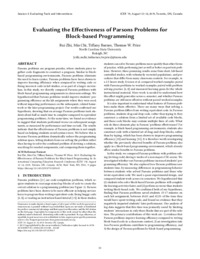Evaluating the Effectiveness of Parsons Problems for Block-based Programming Publikationsdatum:
Zu finden in: ICER 2019, 2019
|
 |
 Diese Seite wurde seit 1 Jahr inhaltlich nicht mehr aktualisiert.
Unter Umständen ist sie nicht mehr aktuell.
Diese Seite wurde seit 1 Jahr inhaltlich nicht mehr aktualisiert.
Unter Umständen ist sie nicht mehr aktuell.
 Zusammenfassungen
Zusammenfassungen
Parsons problems are program puzzles, where students piece together code fragments to construct a program. Similar to block-based programming environments, Parsons problems eliminate the need to learn syntax. Parsons problems have been shown to improve learning efficiency when compared to writing code or fixing incorrect code in lab studies, or as part of a larger curriculum. In this study, we directly compared Parsons problems with block-based programming assignments in classroom settings. We hypothesized that Parsons problems would improve students' programming efficiency on the lab assignments where they were used, without impacting performance on the subsequent, related homework or the later programming project. Our results confirmed our hypothesis, showing that on average Parsons problems took students about half as much time to complete compared to equivalent programming problems. At the same time, we found no evidence to suggest that students performed worse on subsequent assignments, as measured by performance and time on task. The results indicate that the effectiveness of Parsons problems is not simply based on helping students avoid syntax errors. We believe this is because Parsons problems dramatically reduce the programming solution space, letting students focus on solving the problem rather than having to solve the combined problem of devising a solution, searching for needed components, and composing them together.
 Dieses Konferenz-Paper erwähnt ...
Dieses Konferenz-Paper erwähnt ...
 Personen KB IB clear | Tiffany Barnes , Veronica Cateté , Jason Chen , Nick Cheng , Paul Denny , Barbara J. Ericson , James D. Foley , Mark Guzdial , Patricia Haden , Brian Harrington , Juha Helminen , Petri Ihantola , Kyle James Harms , Ville Karavirta , Caitlin Kelleher , Zhongxiu Liu , Andrew Luxton-Reilly , Lauri Malmi , Briana B. Morrison , Miranda C. Parker , Dale Parsons , Thomas W. Price , Jochen Rick , Kantwon Rogers , Beth Simon | ||||||||||||||||||||||||||||||||||||||||||||||||||||||||||||||||||||||||
 Begriffe KB IB clear | blockbasierte Programmierumgebungenvisual programming language
, cognitive load theory (CLT)
, Parsons ProblemeParsons Problems
,  Programmieren Programmieren programming
, Programmiersprachenprogramming languages programming
, Programmiersprachenprogramming languages
| ||||||||||||||||||||||||||||||||||||||||||||||||||||||||||||||||||||||||
 Bücher |
| ||||||||||||||||||||||||||||||||||||||||||||||||||||||||||||||||||||||||
 Texte |
 Dieses Konferenz-Paper erwähnt vermutlich nicht ...
Dieses Konferenz-Paper erwähnt vermutlich nicht ... 
 Nicht erwähnte Begriffe | Scratch |
 Tagcloud
Tagcloud
 Zitationsgraph
Zitationsgraph
 Zitationsgraph (Beta-Test mit vis.js)
Zitationsgraph (Beta-Test mit vis.js)
 Zeitleiste
Zeitleiste
 Anderswo finden
Anderswo finden
 Volltext dieses Dokuments
Volltext dieses Dokuments
 |  Evaluating the Effectiveness of Parsons Problems for Block-based Programming: Fulltext at the ACM Digital Library ( Evaluating the Effectiveness of Parsons Problems for Block-based Programming: Fulltext at the ACM Digital Library ( : :  , 2495 kByte; , 2495 kByte;  : :  2021-03-21) 2021-03-21) |
 Anderswo suchen
Anderswo suchen 
 Beat und dieses Konferenz-Paper
Beat und dieses Konferenz-Paper
Beat hat Dieses Konferenz-Paper während seiner Zeit am Institut für Medien und Schule (IMS) ins Biblionetz aufgenommen. Beat besitzt kein physisches, aber ein digitales Exemplar. Eine digitale Version ist auf dem Internet verfügbar (s.o.). Es gibt bisher nur wenige Objekte im Biblionetz, die dieses Werk zitieren.

















 Biblionetz-History
Biblionetz-History